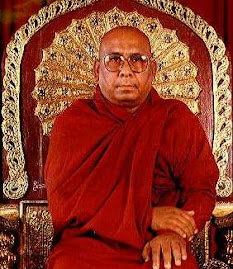Since we were childhood, from generation to generation, it has being heard about the word ‘Education’. Our parents told us ‘education’, our teachers told us about it, our sisters and brothers have explained it. So we as people have being familiar with the word “EDUCATION’.
But if we think about the ‘education’ deeply, it is crucial to the wellbeing of everyone. If we consider about ‘education’, we generally immediately highlight ‘university’. Yes, ‘university’ is a place where everyone can learn people skills, technological skills, and other knowledge to support oneself. University is one of the important places where well-educated and well-rounded talents are born. These well-educated and well-rounded generations are the most important human resource to support economic, social, political developments for future generations.
For instance, engineering graduates can support science, technology, and innovation to our country. They can support toward a modernized country – better roads, infrastructures and IT system.
As business graduates, it can support to promote international trade. Medical graduates are able to support health care and healthy long-living of its citizens. Political science, public policy and administration graduates will support for developing efficient and effective government system, rules and regulations, laws and nation building. Hence, ‘education’ is the most important pillar in seeking our citizens’ aspirations – toward a modernized country.
Thus we can understand the word ‘education’ that is important not only for oneself but for every country. We can define “a country” is a place where millions of individuals are living together under the integrated established political, legal, educational, cultural and social systems.
Building a nation is the building of different sectors of its components. These components are the arts, child policy, civil justice, education, energy and environment, health and health care, international affairs, national security, population and aging, public safety, science and technology, substance abuse, terrorism and homeland security, transportation infrastructure, workforce and workplace.
‘Education’ is one component of the nation building priorities that must be integrated into the national system. Let consider about Singapore that is a country where no abundant resources. But today, this country is one of the world’s well-developed, higher living standard and secure place. If we study about Singapore, from the early stage till now, ‘education’ is one of its top national priorities to become the well-known and well-developed country. It has being invested in education to develop skills, knowledge and IT. Well-skilled, well-trained and well-rounded knowledge human resources are the keys to Singapore to become one the best place to invest for international investors. Hence, we will be able to understand the importance of education as the part of the nation building with the following key notes:
“Education is one of our top national priorities. Education is not just for the most precious gift to our children, but also the most critical investment for our future and the most effective success strategy to endure and thrive in a changing world.”
Prime Minister Lee Hsien Loong
Teachers’ Day Rally 2006.
“In the 21st century, the best anti-poverty program around is a world-class education.”
President Obama
Remarks by the President in State of the Union Address, U.S.Capitol, 2010
If we sum up about these findings, ‘EDUCATION’ (a well-integrated education system and policy are the important tools in marching toward a modernized country that our citizens have being hoped and dreamt over long decades.
P.Latt
19.04.2010
Monday, April 19, 2010
Sunday, January 31, 2010
The Importance of Education to Eliminate Poverty in Society
In studying the development of every society, we can find there are many critical pillars that build society into a more developed and modernized place. In every country, politics, economics, society, education, health care are important pillars that shape every country.
Among these pillars, “EDUCATION” has been one the most important pillars to uplift the well-being of every society. Today, we have seen that the Republic of China shapes an important part of the world economy, playing the very important role in international society. Higher living standards, well-educated people and prosperity are transparent evident in China. So we can ask ourselves that what has changed China to become such kind of country. Good education and well-educated people are the most important resources to lift the economy of China.
So we should ask ourselves what is “Education” and how it can help to eliminate poverty and how it can lead to well-being of every country?
We can find the meaning of education defined by Eric Hoffer……
“The central task of education is to implant a will and facility for learning; it should
produce not learned but learning people. The truly human society is a learning society,
where grandparents, parents, and children are students together.” ~Eric Hoffer
“No one has yet realized the wealth of sympathy, the kindness and generosity hidden in
the soul of a child. The effort of every true education should be to unlock that treasure.”
~Emma Goldman
Thus ‘EDUCATION’ is learning about people, issues in society and then how to nurse new generation for the society. The education impacts greatly other sectors of every country. Because of education, we can see several interrelated issues in every society.
Two consistent research findings in the social sciences relate to the relationship between economic and education variables, and therefore between education and poverty. Educational research has consistently found home background (socioeconomic status) to be an important determinant of educational outcomes, and economic research has shown that education strongly affects earnings.
Poverty is not simply the absence of financial resources. According to Amartya Sen, poverty is the lack of capability to function effectively in society. Inadequate education can thus be considered a form of poverty. Absolute poverty – the absence of adequate resources – hampers learning in developing countries through poor nutrition, health, home circumstances (lack of books, lighting or places to do homework) and parental education. It discourages enrolment and survival to higher grades, and also reduces learning in schools. The relative poverty perspective emphasizes exclusion from the mainstream in rich countries, which can reduce the motivation of the relatively poor and their ability to gain full benefits from education.
Education can reduce poverty in a number of ways:
1.Firstly, more educated people are more likely to get jobs, are more productive, and earn more.
2.Secondly, recent research shows that quality-adjusted education is important for economic growth. More and better education improves a poor country’s economic growth and thereby generates economic opportunities and incomes.
3.Thirdly, education (particularly of girls) brings social benefits that improve the situation of the poor, such as lower fertility, improved health care of children, and greater participation of women in the labor market.
According to practical findings and research in International Society, EDUCATION is the most important pillar to eliminate poverty, to rebuild, to attain higher living standard and to modernize every country. Hence, the Joining Hands’ efforts to fulfill the education needs of the orphanage in rural areas in our country are a very genuine attitudes and an act of mercy toward filling the gaps within our society. On the other hand, we can tell that Charity Organizations are shaping the future and well-being these orphanages as much as they can.
I still remember about the remarkable slogan of President Obama during his speech at University of Maryland. He gave remarkable speech during his speech about changing Health Care Policy in the USA.
“If a voice can change a room, it can change a city. And if it can change a city, it can change a state. If it can change a state, it can change a nation. If it can change a nation, it can change the world.”
President Obama
So if every charity organization can fulfill the educational needs of a number of orphanages, many charity organizations can fulfill the educational needs of millions of people in our country.
And so toward “ A WELL DEVELOPED AND MORE MODERNIZED COUNTRY.”
P.Latt
28.01.2010
Sources: 1. Teacher’s Mind Resources: http://www.TeachersMind.com
2. The International Institute for Educational Planning (IIEP), UNESCO
3. Health Care Reform Speech at University of Maryland, Sept 17, 2009
So we should ask ourselves what is “Education” and how it can help to eliminate poverty and how it can lead to well-being of every country?
We can find the meaning of education defined by Eric Hoffer……
“The central task of education is to implant a will and facility for learning; it should
produce not learned but learning people. The truly human society is a learning society,
where grandparents, parents, and children are students together.” ~Eric Hoffer
“No one has yet realized the wealth of sympathy, the kindness and generosity hidden in
the soul of a child. The effort of every true education should be to unlock that treasure.”
~Emma Goldman
Thus ‘EDUCATION’ is learning about people, issues in society and then how to nurse new generation for the society. The education impacts greatly other sectors of every country. Because of education, we can see several interrelated issues in every society.
Two consistent research findings in the social sciences relate to the relationship between economic and education variables, and therefore between education and poverty. Educational research has consistently found home background (socioeconomic status) to be an important determinant of educational outcomes, and economic research has shown that education strongly affects earnings.
Poverty is not simply the absence of financial resources. According to Amartya Sen, poverty is the lack of capability to function effectively in society. Inadequate education can thus be considered a form of poverty. Absolute poverty – the absence of adequate resources – hampers learning in developing countries through poor nutrition, health, home circumstances (lack of books, lighting or places to do homework) and parental education. It discourages enrolment and survival to higher grades, and also reduces learning in schools. The relative poverty perspective emphasizes exclusion from the mainstream in rich countries, which can reduce the motivation of the relatively poor and their ability to gain full benefits from education.
Education can reduce poverty in a number of ways:
1.Firstly, more educated people are more likely to get jobs, are more productive, and earn more.
2.Secondly, recent research shows that quality-adjusted education is important for economic growth. More and better education improves a poor country’s economic growth and thereby generates economic opportunities and incomes.
3.Thirdly, education (particularly of girls) brings social benefits that improve the situation of the poor, such as lower fertility, improved health care of children, and greater participation of women in the labor market.
According to practical findings and research in International Society, EDUCATION is the most important pillar to eliminate poverty, to rebuild, to attain higher living standard and to modernize every country. Hence, the Joining Hands’ efforts to fulfill the education needs of the orphanage in rural areas in our country are a very genuine attitudes and an act of mercy toward filling the gaps within our society. On the other hand, we can tell that Charity Organizations are shaping the future and well-being these orphanages as much as they can.
I still remember about the remarkable slogan of President Obama during his speech at University of Maryland. He gave remarkable speech during his speech about changing Health Care Policy in the USA.
“If a voice can change a room, it can change a city. And if it can change a city, it can change a state. If it can change a state, it can change a nation. If it can change a nation, it can change the world.”
President Obama
So if every charity organization can fulfill the educational needs of a number of orphanages, many charity organizations can fulfill the educational needs of millions of people in our country.
And so toward “ A WELL DEVELOPED AND MORE MODERNIZED COUNTRY.”
P.Latt
28.01.2010
Sources: 1. Teacher’s Mind Resources: http://www.TeachersMind.com
2. The International Institute for Educational Planning (IIEP), UNESCO
3. Health Care Reform Speech at University of Maryland, Sept 17, 2009
Monday, October 19, 2009
တြံေတးၿမိဳ႕နယ္ မိဘမဲ့ကေလးမ်ားကုိ ေထာက္ပံ့
ျမင့္မုိးေဇာ္/ ၂၄ ႏုိ၀င္ဘာ ၂၀၀၈

ၿပီးခဲ့သည့္ နုိ၀င္ဘာ (၂၂) ရက္ေန႔ အမ်ိဳးသားေအာင္ပြဲေန႔တြင္ တြဲ-ကူ-လက္ လူငယ္မ်ားအဖြဲ႕ဟု အမည္ေပးထားသည့္ လူငယ္အဖြဲ႕တဖြဲ႕သည္ တြံေတးၿမိဳ႕၊ ဘုရားႀကီးေက်းရြာရွိ မိဘမဲ့ကေလးမ်ားအား ေပ်ာ္ပြဲရႊင္ပြဲမ်ား၊ ပညာသင္ေထာက္ ကူျပဳပစၥည္းမ်ားကုိ ေပးအပ္လႉဒါန္းခဲ့ၾကသည္။
အဆိုပါ တြဲ-ကူ-လက္အဖြဲ ့ကုိ ၁၉၉၈ ခုႏွစ္မွ စတင္ကာ တကၠသုိလ္ေက်ာင္းသားေဟာင္းမ်ားက စတင္ဖြဲ႕စည္းခဲ့ျခင္းျဖစ္ၿပီး ဖြဲ႕စည္းစဥ္ကတည္းက ႏွစ္စဥ္အမ်ိဳးသားေန႔ေရာက္တုိင္း မိဘမဲ့ ကေလးမ်ားအား ပညာေရး၊ လူမႈေရးႏွင့္ က်န္းမာေရးလုပ္ငန္းမ်ားကုိ ကူညီေပးရန္အတြက္ တည္ေထာင္ခဲ့ျခင္းျဖစ္သည္ဟု အဆုိပါ တြဲ-ကူ-လက္လူငယ္မ်ားအဖြဲ႕၀င္တဦးျဖစ္သူ မခင္လွလွက ေခတ္ၿပိဳင္သုိ႔ ေျပာသည္။
“က်မတုိ ဒီႏွစ္မွာေတာ့ တြံေတးမွာရွိတဲ့ ဘုရားႀကီး ေက်ာင္းတုိက္မွာ ဖြင့္လွစ္ထားတဲ့ မိဘမဲ့ကေလးမ်ားေက်ာင္းကုိ္ အလွည့္က်ပါတယ္။ ဒီႏွစ္မွာေတာ့ တြံေတးကုိ ဘာေၾကာင့္ ေရြးခ်ယ္ရတာလည္းဆုိရင္ နာဂစ္ေလမုန္တုိင္းဒဏ္ေၾကာင့္ ပ်က္စီးခဲ့တဲ့ေဒသေတြမွာ တြံေတးၿမိဳ႕နယ္လည္း ပါ၀င္ခဲ့တယ္။ အဲဒီလုိေလမုန္တုိင္းဒဏ္ေၾကာင့္ပဲ မိဘမဲ့ကေလးငယ္ (၃) ဦးလည္း ေသဆုံးခဲ့ရတယ္။ ဒါေၾကာင့္ ဒီႏွစ္မွာ ဘုရားႀကီးေက်ာင္းတုိက္မွာ ဖြင့္လွစ္ထားတဲ့ ေနရာကုိ ေရြးခ်ယ္လုိက္တာျဖစ္ပါတယ္” ဟု မခင္လွလွက ရွင္းျပသည္။
တြဲ-ကူ-လက္လူငယ္မ်ားအဖြဲ ့၀င္တဦးျဖစ္သူ ကုိ္ေနသူစုိးကလည္း “က်ေနာ္တုိ႔ အခုနွစ္မွာ ကေလးငယ္ေတြရဲ႕ က်န္းမာေရးစစ္ေဆးမႈေတြ ျပဳလုပ္ေပးတာအျပင္ က်ေနာ္တုိ႔ အဖြဲ႕မွာ ပါ၀င္တဲ့ သြားဆရာ၀န္တဦးကေနၿပီး တကုိယ္ေရသန္႔ရွင္းမႈအေၾကာင္းကုိ ကေလးေတြ နားလည္ေအာင္ ေဟာေျပာမႈေတြလုပ္ခဲ့ပါတယ္။ ၿပီးေတာ့ ေန႔လယ္ပုိင္းမွာေတာ့ ကေလးေတြကုိ ေပ်ာ္ရႊင္စရာ ေျဖေဖ်ာ္မႈအစီအစဥ္ေတြ၊ ကစားပြဲေတြ လုပ္ေပးခဲ့ပါတယ္။ ေနာက္ၿပီး ကေလးငယ္ (၂၈၀) ေက်ာ္ကုိ နံနက္စာနဲ႔ေကၽြးေမြးၿပီး သူတုိ႔ ပညာသင္ၾကားရာမွာ လုိအပ္တဲ့ သင္ေထာက္ကူပစၥည္းတန္ဖုိး (၂၇) သိန္းဖုိးကုိလည္း လႉဒါန္းခဲ့ပါတယ္” ဟု ေျပာသည္။
အမ်ိဳးသားေန႔ကုိ ေရြးခ်ယ္ခဲ့ရျခင္းမွာလည္း ျမန္မာ့သမုိင္းမွာ တကၠသုိလ္ေက်ာင္းသားမ်ားက တကၠသုိလ္ဥပေဒကုိ မႀကိဳက္လုိ႔ စတင္သပိတ္ေမွာက္ခဲ့ရာကေန တုိင္းျပည္လြတ္လပ္ေရးရ ေအာင္ လုပ္ေဆာင္ႏုိင္ခဲ့သည့္ေန႔ကုိ ဂုဏ္ျပဳသည့္သေဘာလည္း ေရာက္ျခင္းေၾကာင့္ အမ်ိဳးသားေန႔မွာ မိဘမဲ့ကေလးမ်ားအတြက္ ပညာေရးေထာက္ပံ့မႈေတြကုိ လုပ္ျခင္းျဖစ္သည္ ဟု ကုိ္ေနသူစုိးက ဆက္ေျပာသည္။
ထုိ႔ေနာက္ ယခုကဲ့သုိ႔ ကေလးငယ္မ်ားအား ေထာက္ကူမႈေပးႏုိင္ရန္အတြက္ ရန္ပုံေငြကုိ ဘယ္လုိရွာေဖြသလဲဆုိတာကိုလည္း အဖြဲ ့၀င္တဦးျဖစ္သူ မခင္လွလွကပဲ “အခုဆုိရင္ က်မတုိ႔ အဖြဲ႔၀င္ေတြထဲမွာ ပါ၀င္သူတခ်ိဳ႕ဟာ ႏုိင္ငံျခားမွာ သြားၿပီးအလုပ္လုပ္ေနၾကပါတယ္။ သူတုိ႔ ေတြကလည္း ႏွစ္တုိင္းအမ်ိဳးသားေန႔ကုိေရာက္ၿပီဆုိရင္ ကေလးငယ္ေတြက္ုိ ကူညီေထာက္ပံ ့ ေပးႏုိင္ဖုိ႔ကုိ လွမ္းၿပီး ေငြပုိ႔ေပးပါတယ္။ အခုေလာေလာဆယ္ေတာ့ သီးသန္႔ ရန္ပုံေငြေကာက္ ခံတာမ်ိဳးမလုပ္ဘဲ အဖြဲ ့၀င္ေတြကပဲ ကုိယ္လက္လွမ္းမွီသမွ် ေကာက္ခံၿပီး လုပ္တဲ့သေဘာပါ” ဟု ေခတ္ၿပိဳင္သုိ ့ရွင္းလင္းေျပာၾကားခဲ့သည္။
မွတ္ခ်က္။ ။ ဒီသတင္းမွာပါ၀င္တဲ့အခ်က္တခ်က္ျဖစ္တဲ့""အမ်ိဳးသားေန႔ကုိ ေရြးခ်ယ္ခဲ့ရျခင္းမွာလည္း ျမန္မာ့သမုိင္းမွာ တကၠသုိလ္ေက်ာင္းသားမ်ားက တကၠသုိလ္ဥပေဒကုိ မႀကိဳက္လုိ႔ စတင္သပိတ္ေမွာက္ခဲ့ရာကေန တုိင္းျပည္လြတ္လပ္ေရးရ ေအာင္ လုပ္ေဆာင္ႏုိင္ခဲ့သည့္ေန႔ကုိ ဂုဏ္ျပဳသည့္သေဘာလည္း ေရာက္ျခင္းေၾကာင့္ အမ်ိဳးသားေန႔မွာ မိဘမဲ့ကေလးမ်ားအတြက္ ပညာေရးေထာက္ပံ့မႈေတြကုိ လုပ္ျခင္းျဖစ္သည္။"" ဆိုတဲ့အခ်က္ကေတာ့ကြ်န္ေတာ္တို႔ရဲ႕ျဖဴစင္တဲ့ ေစတနာကိုအျမင္ေျပာင္းလဲႏိုင္တဲ့အတြက္ဤအခ်က္ျဖင့္အမ်ဳိးသားေန႔ကိုေရြးခ်ယ္ခဲ့ျခင္းမဟုတ္ေၾကာင္းအားလံုးကိုအသိေပးလိုပါတယ္။ အားလံုးအဆင္ေျပမယ့္ရက္ကို ေရြးခ်ယ္ရင္းအမွတ္တရသီးသီးသန္႔သန္႔ရက္ျဖစ္ေစလိုတာေၾကာင့္သာ အမ်ဳိးသားေန႔ကိုေရြးခ်ယ္ခဲ့ျခင္းျဖစ္ပါသည္။

ၿပီးခဲ့သည့္ နုိ၀င္ဘာ (၂၂) ရက္ေန႔ အမ်ိဳးသားေအာင္ပြဲေန႔တြင္ တြဲ-ကူ-လက္ လူငယ္မ်ားအဖြဲ႕ဟု အမည္ေပးထားသည့္ လူငယ္အဖြဲ႕တဖြဲ႕သည္ တြံေတးၿမိဳ႕၊ ဘုရားႀကီးေက်းရြာရွိ မိဘမဲ့ကေလးမ်ားအား ေပ်ာ္ပြဲရႊင္ပြဲမ်ား၊ ပညာသင္ေထာက္ ကူျပဳပစၥည္းမ်ားကုိ ေပးအပ္လႉဒါန္းခဲ့ၾကသည္။
အဆိုပါ တြဲ-ကူ-လက္အဖြဲ ့ကုိ ၁၉၉၈ ခုႏွစ္မွ စတင္ကာ တကၠသုိလ္ေက်ာင္းသားေဟာင္းမ်ားက စတင္ဖြဲ႕စည္းခဲ့ျခင္းျဖစ္ၿပီး ဖြဲ႕စည္းစဥ္ကတည္းက ႏွစ္စဥ္အမ်ိဳးသားေန႔ေရာက္တုိင္း မိဘမဲ့ ကေလးမ်ားအား ပညာေရး၊ လူမႈေရးႏွင့္ က်န္းမာေရးလုပ္ငန္းမ်ားကုိ ကူညီေပးရန္အတြက္ တည္ေထာင္ခဲ့ျခင္းျဖစ္သည္ဟု အဆုိပါ တြဲ-ကူ-လက္လူငယ္မ်ားအဖြဲ႕၀င္တဦးျဖစ္သူ မခင္လွလွက ေခတ္ၿပိဳင္သုိ႔ ေျပာသည္။
“က်မတုိ ဒီႏွစ္မွာေတာ့ တြံေတးမွာရွိတဲ့ ဘုရားႀကီး ေက်ာင္းတုိက္မွာ ဖြင့္လွစ္ထားတဲ့ မိဘမဲ့ကေလးမ်ားေက်ာင္းကုိ္ အလွည့္က်ပါတယ္။ ဒီႏွစ္မွာေတာ့ တြံေတးကုိ ဘာေၾကာင့္ ေရြးခ်ယ္ရတာလည္းဆုိရင္ နာဂစ္ေလမုန္တုိင္းဒဏ္ေၾကာင့္ ပ်က္စီးခဲ့တဲ့ေဒသေတြမွာ တြံေတးၿမိဳ႕နယ္လည္း ပါ၀င္ခဲ့တယ္။ အဲဒီလုိေလမုန္တုိင္းဒဏ္ေၾကာင့္ပဲ မိဘမဲ့ကေလးငယ္ (၃) ဦးလည္း ေသဆုံးခဲ့ရတယ္။ ဒါေၾကာင့္ ဒီႏွစ္မွာ ဘုရားႀကီးေက်ာင္းတုိက္မွာ ဖြင့္လွစ္ထားတဲ့ ေနရာကုိ ေရြးခ်ယ္လုိက္တာျဖစ္ပါတယ္” ဟု မခင္လွလွက ရွင္းျပသည္။
တြဲ-ကူ-လက္လူငယ္မ်ားအဖြဲ ့၀င္တဦးျဖစ္သူ ကုိ္ေနသူစုိးကလည္း “က်ေနာ္တုိ႔ အခုနွစ္မွာ ကေလးငယ္ေတြရဲ႕ က်န္းမာေရးစစ္ေဆးမႈေတြ ျပဳလုပ္ေပးတာအျပင္ က်ေနာ္တုိ႔ အဖြဲ႕မွာ ပါ၀င္တဲ့ သြားဆရာ၀န္တဦးကေနၿပီး တကုိယ္ေရသန္႔ရွင္းမႈအေၾကာင္းကုိ ကေလးေတြ နားလည္ေအာင္ ေဟာေျပာမႈေတြလုပ္ခဲ့ပါတယ္။ ၿပီးေတာ့ ေန႔လယ္ပုိင္းမွာေတာ့ ကေလးေတြကုိ ေပ်ာ္ရႊင္စရာ ေျဖေဖ်ာ္မႈအစီအစဥ္ေတြ၊ ကစားပြဲေတြ လုပ္ေပးခဲ့ပါတယ္။ ေနာက္ၿပီး ကေလးငယ္ (၂၈၀) ေက်ာ္ကုိ နံနက္စာနဲ႔ေကၽြးေမြးၿပီး သူတုိ႔ ပညာသင္ၾကားရာမွာ လုိအပ္တဲ့ သင္ေထာက္ကူပစၥည္းတန္ဖုိး (၂၇) သိန္းဖုိးကုိလည္း လႉဒါန္းခဲ့ပါတယ္” ဟု ေျပာသည္။
အမ်ိဳးသားေန႔ကုိ ေရြးခ်ယ္ခဲ့ရျခင္းမွာလည္း ျမန္မာ့သမုိင္းမွာ တကၠသုိလ္ေက်ာင္းသားမ်ားက တကၠသုိလ္ဥပေဒကုိ မႀကိဳက္လုိ႔ စတင္သပိတ္ေမွာက္ခဲ့ရာကေန တုိင္းျပည္လြတ္လပ္ေရးရ ေအာင္ လုပ္ေဆာင္ႏုိင္ခဲ့သည့္ေန႔ကုိ ဂုဏ္ျပဳသည့္သေဘာလည္း ေရာက္ျခင္းေၾကာင့္ အမ်ိဳးသားေန႔မွာ မိဘမဲ့ကေလးမ်ားအတြက္ ပညာေရးေထာက္ပံ့မႈေတြကုိ လုပ္ျခင္းျဖစ္သည္ ဟု ကုိ္ေနသူစုိးက ဆက္ေျပာသည္။
ထုိ႔ေနာက္ ယခုကဲ့သုိ႔ ကေလးငယ္မ်ားအား ေထာက္ကူမႈေပးႏုိင္ရန္အတြက္ ရန္ပုံေငြကုိ ဘယ္လုိရွာေဖြသလဲဆုိတာကိုလည္း အဖြဲ ့၀င္တဦးျဖစ္သူ မခင္လွလွကပဲ “အခုဆုိရင္ က်မတုိ႔ အဖြဲ႔၀င္ေတြထဲမွာ ပါ၀င္သူတခ်ိဳ႕ဟာ ႏုိင္ငံျခားမွာ သြားၿပီးအလုပ္လုပ္ေနၾကပါတယ္။ သူတုိ႔ ေတြကလည္း ႏွစ္တုိင္းအမ်ိဳးသားေန႔ကုိေရာက္ၿပီဆုိရင္ ကေလးငယ္ေတြက္ုိ ကူညီေထာက္ပံ ့ ေပးႏုိင္ဖုိ႔ကုိ လွမ္းၿပီး ေငြပုိ႔ေပးပါတယ္။ အခုေလာေလာဆယ္ေတာ့ သီးသန္႔ ရန္ပုံေငြေကာက္ ခံတာမ်ိဳးမလုပ္ဘဲ အဖြဲ ့၀င္ေတြကပဲ ကုိယ္လက္လွမ္းမွီသမွ် ေကာက္ခံၿပီး လုပ္တဲ့သေဘာပါ” ဟု ေခတ္ၿပိဳင္သုိ ့ရွင္းလင္းေျပာၾကားခဲ့သည္။
မွတ္ခ်က္။ ။ ဒီသတင္းမွာပါ၀င္တဲ့အခ်က္တခ်က္ျဖစ္တဲ့""အမ်ိဳးသားေန႔ကုိ ေရြးခ်ယ္ခဲ့ရျခင္းမွာလည္း ျမန္မာ့သမုိင္းမွာ တကၠသုိလ္ေက်ာင္းသားမ်ားက တကၠသုိလ္ဥပေဒကုိ မႀကိဳက္လုိ႔ စတင္သပိတ္ေမွာက္ခဲ့ရာကေန တုိင္းျပည္လြတ္လပ္ေရးရ ေအာင္ လုပ္ေဆာင္ႏုိင္ခဲ့သည့္ေန႔ကုိ ဂုဏ္ျပဳသည့္သေဘာလည္း ေရာက္ျခင္းေၾကာင့္ အမ်ိဳးသားေန႔မွာ မိဘမဲ့ကေလးမ်ားအတြက္ ပညာေရးေထာက္ပံ့မႈေတြကုိ လုပ္ျခင္းျဖစ္သည္။"" ဆိုတဲ့အခ်က္ကေတာ့ကြ်န္ေတာ္တို႔ရဲ႕ျဖဴစင္တဲ့ ေစတနာကိုအျမင္ေျပာင္းလဲႏိုင္တဲ့အတြက္ဤအခ်က္ျဖင့္အမ်ဳိးသားေန႔ကိုေရြးခ်ယ္ခဲ့ျခင္းမဟုတ္ေၾကာင္းအားလံုးကိုအသိေပးလိုပါတယ္။ အားလံုးအဆင္ေျပမယ့္ရက္ကို ေရြးခ်ယ္ရင္းအမွတ္တရသီးသီးသန္႔သန္႔ရက္ျဖစ္ေစလိုတာေၾကာင့္သာ အမ်ဳိးသားေန႔ကိုေရြးခ်ယ္ခဲ့ျခင္းျဖစ္ပါသည္။
Subscribe to:
Posts (Atom)


